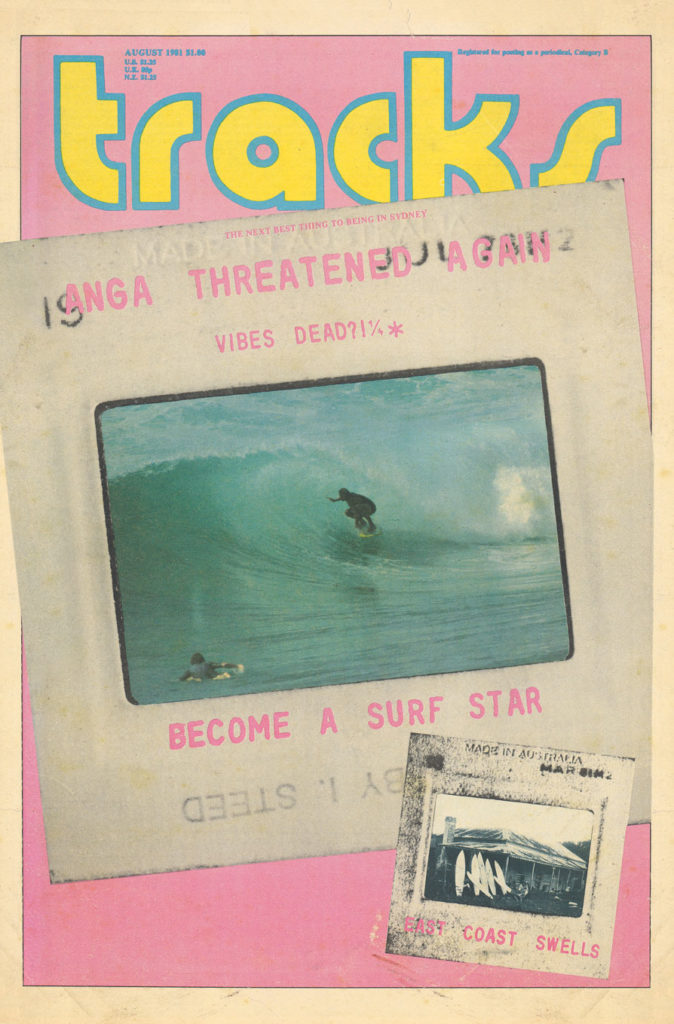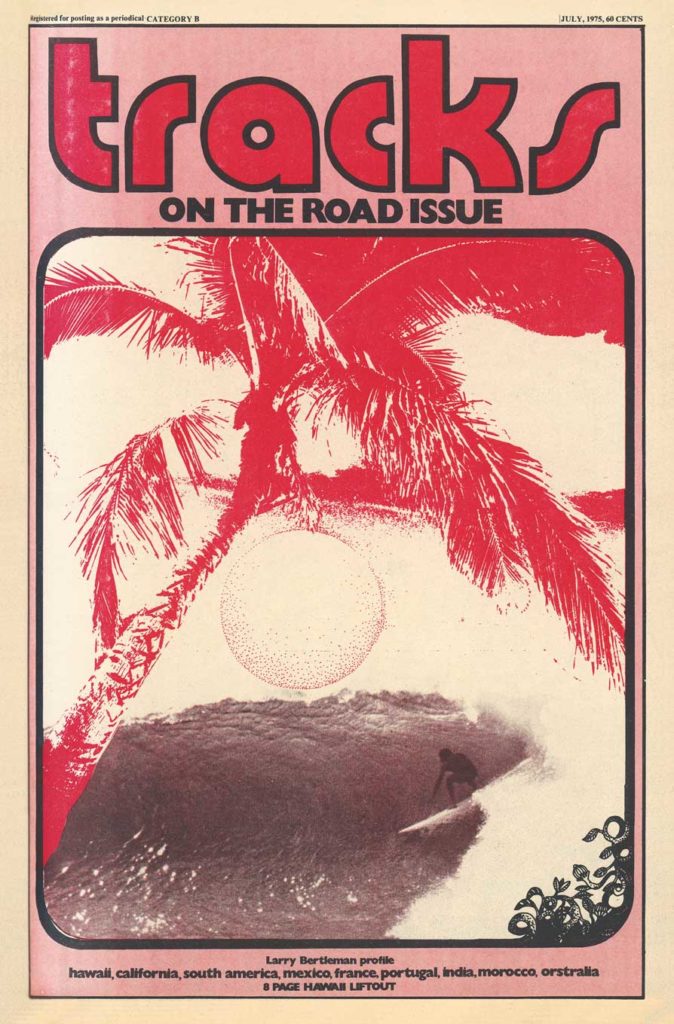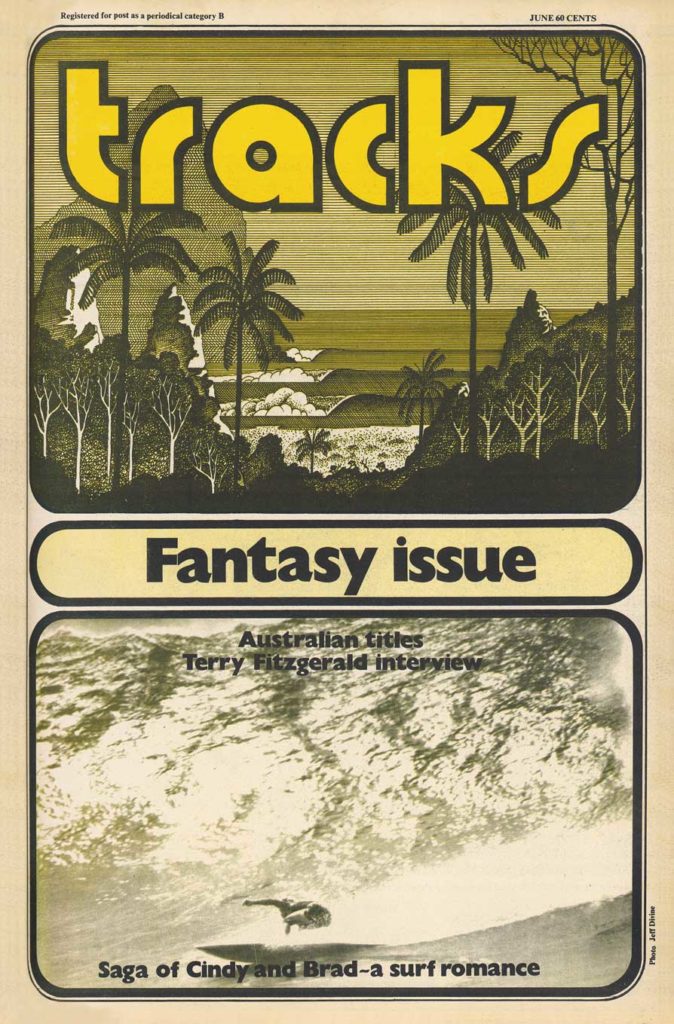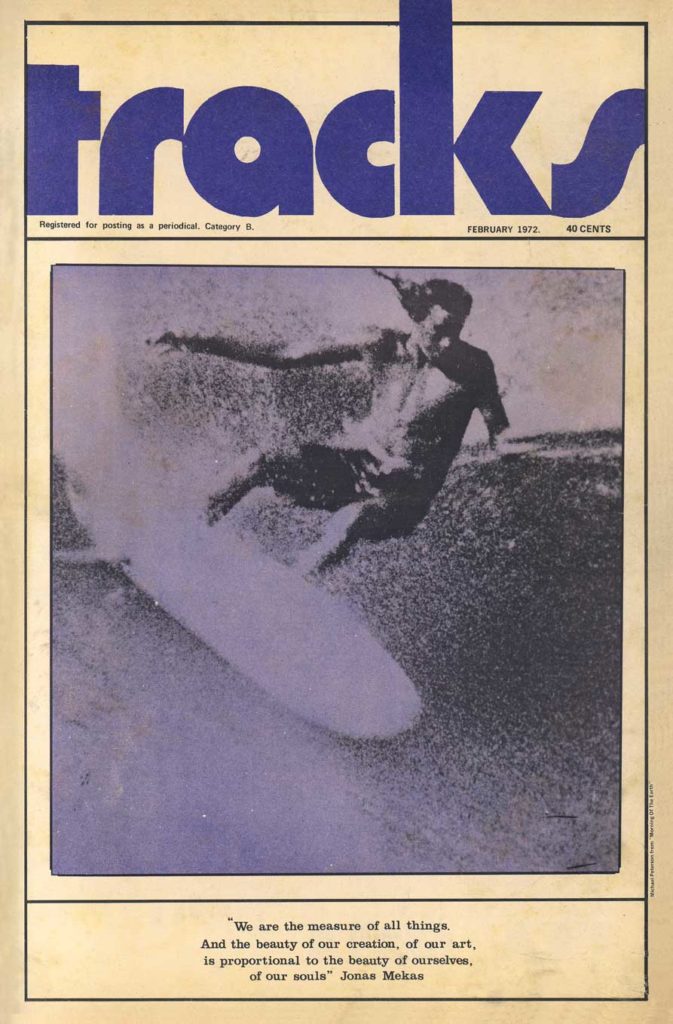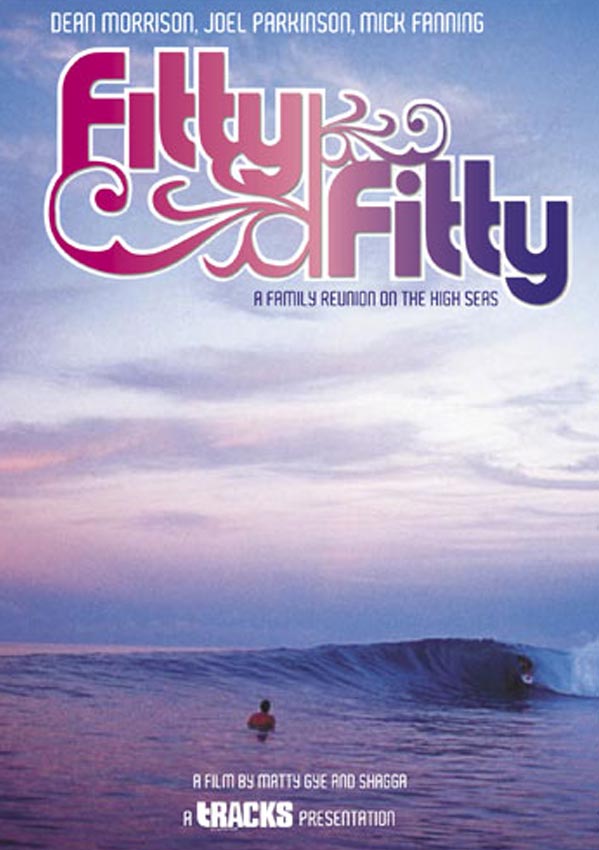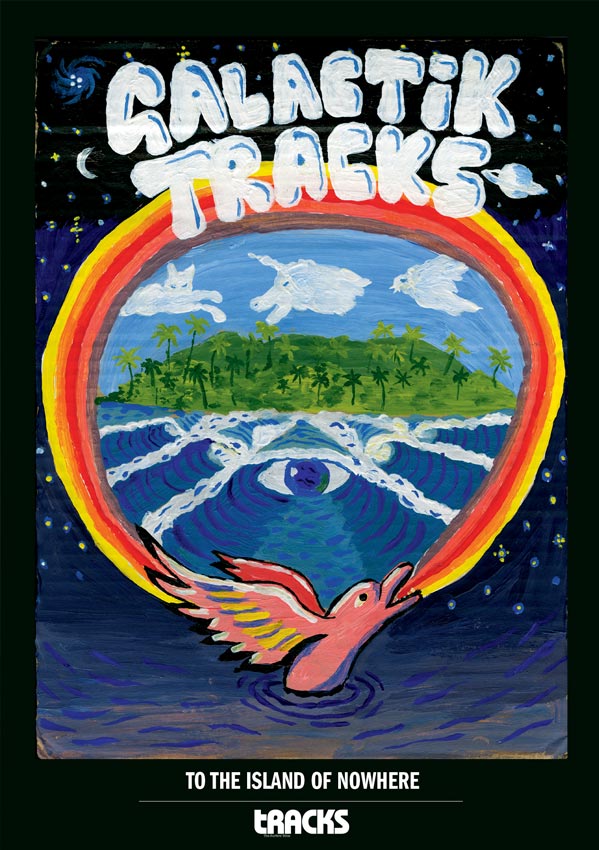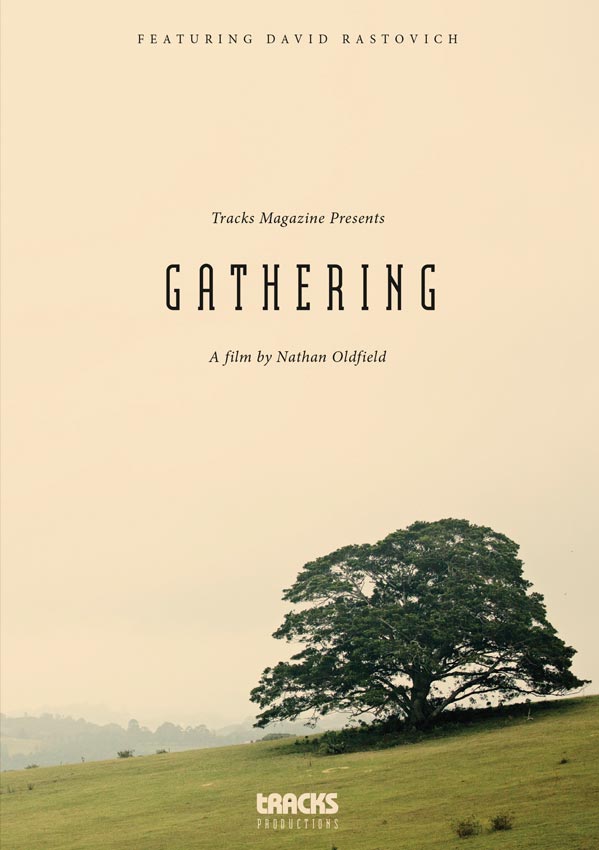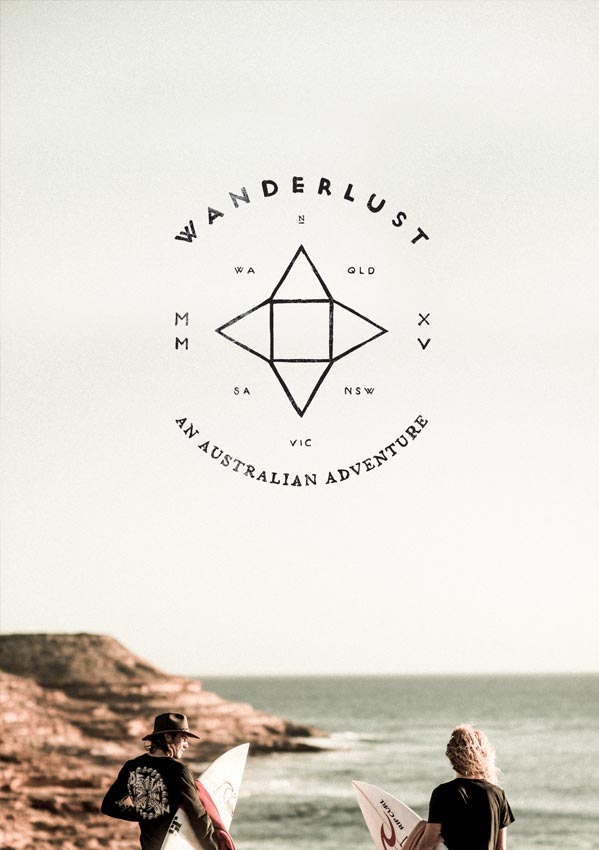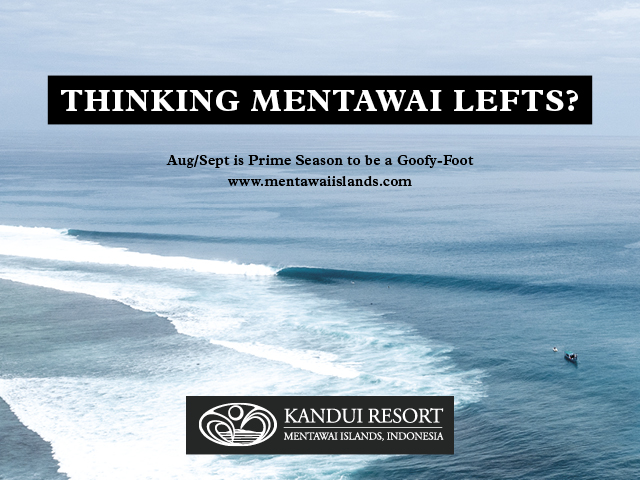John Witzig’s 1971 Tracks interview remains one of the most compelling and candid portrayals of Midget Farrelly. While Witzig adopts a very direct line of questioning, Midget doesn’t pull any punches with his responses and the end result is a discussion with depth, intelligence and a few obvious disputes. In the revealing exchange a highly opinionated Midget expresses his views on real surfers Vs fair-weather surfers, the Australian tall poppy syndrome, his opposition to drugs, a misguided surf media, flawed judging and surfing’s age old riddle of preserving its soul while accommodating commercial interests. Many of the issues raised remain relevant in a modern context. It’s well worth the long read, whether you are a Midget enthusiast or a younger surfer who wants a genuine insight into an intriguing character who shaped surfing history.
Note: It hots up more in the latter stages so hang in there.
Main Photo Above: A short back and sides Midget playing the role of Australian ambassador at the 1964 World titles. Photo: Jack Eden.

John Witzig 1971:What's your most pleasant memory of surfing?
Probably some of the early years. I think when there were fewer people in the water
and when I was really just discovering surfing. It was a time when you could be on the beach by yourself and you were able to concentrate on the waves and the beach without the problems that you have today in surfing. Just discovering surfing was really an exciting thing, when I was younger anyway.
Midget: Do you think it's the same for the kids now?
I think it's exactly the same. I think when you surf first you are oblivious to the things that have changed in surfing, you never experienced them. I think the young kids are basically just involved with their surfboards and their waves and trying to ride them. I know they can get side-tracked, but when they first start I'm sure they start the same way I did and the same way that anyone else did, they're just taken up by the newness of the whole thing and that's it.
How do you see your own position in surfing? Well, I think my experiences have fashioned my surfing and my thinking. I started surfing in a period where, if a surfer had talent, he was admired and surfers would rather watch him surf, than hassle him for waves, which is sometimes the case today. I was influenced by ten years of quiet waves in a period where we really chased waves. I don't say that people don't chase waves now, they do, they go all over the world for waves, but myself at that time, ten years ago, surfing was a private thing that didn't have as huge an amount of people in it, as it does now. Now it could be a little more social to surf. I suppose it's cultish to a lot of people. You have only got to look at all Holden station wagons parked at Palm Beach on a Sunday with the groups of surfers and all the girls, and all the trappings of what I think is cultish surfing. They're definitely wearing their uniforms of Levi's and faded T-shirts though I don't say we didn't have our uniforms then. I was influenced in the early years by guys who were radical thinkers; they were . non-conformers; they rejected the idea of building their future while they were young so that could enjoy it while they were old; they were guys who were prepared to do anything so they could surf. They were really a minority in those days. I look around now and I don't see too many of them, not those same people. I think I see the same type of person in a lot of the younger kids but I don't know if they will have the same chance to be non-conformists that those surfers of earlier years did. In those day to be a surfer was a unique thing. It was a pretty rare thing and people held a surfer in awe, you looked strange and behaved differently, and you didn't rely on any of the things that the normal, or so called, normal person did. I always felt that I had a great amount of freedom then… that freedom was a privilege because I 'd discovered surfing and the freedom it gave me was fantastic. It was fantastic to feel because I felt that I had definitely found something that was my own. I still think that today, that ah, if you do surf for yourself, and if you do still choose your own waves, your own day, and your own time to do your surfing in, then you are free. It made me feel that I had something that a lot of other people were blind to; for years I thought that. I didn't look down on them because of it, I just felt that, ah, they were absorbed in what they were doing, and I had found something of my own to be totally absorbed in.
Is it still your own?
Yes, I think so as long as I'm the one that 's doing it.
The image of surfing that you've described I can remember too. You know it really was a trippy thing to be a surfer then and now. Surfers in country towns are dirty long-haired animals which you know, I think it's fair to say that a lot of them are.
Well this is the kind of person that's getting into surfing now. We weren't angels, that's for sure, we did some really rebellious things, ah, some things that we probably wouldn't like to be reminded of today. But what happened to us, was that we had a longer time to assess the value of the surfing that we had, and we came to treasure it. I think a lot of people today particularly the young surfers, they are experiencing surfing the same way people experience a concert a rock'n’roll concert, as a large group, and they have a type of group thinking. I know a lot of people who are very good surfers, who go and surf where they want to surf, under the conditions that they consider the only conditions that they can surf under, and they have evolved their own way. I think that people who have done it in the last few years, who can still do it, just by being themselves and placing themselves in the kind of surfing … or in the atmosphere that allows them to develop or surf very naturally they really have something. The kids around the city beaches develop in their own rocket culture. They are influenced by pocket group thinking … this is what happens at Narrabeen, to a certain extent, that 's what happens here at Avalon. We had our own thinking but we weren't part of a large mass of surfing populace. We were really an isolated group and people were individual thinkers; they still are admittedly, but they're not as easy to single out now, as they were then.
Not really. I took surfing as it came, as much of it as I could take when – well I helped in a way to create the surfing crowd that are around today … you know, helped create surfing popularity. A lot of the people who were in surfing in Australia have done the same thing. I feel like I've experienced a lot of it. I might not Iike the way it's evolved but I sort of feel that I can't change it; it will change itself. The people that are surfing may change it. But I think the fantastic appeal of surfing, you know, it's simplicity, the fact that it can't be classified – it won't sit still to be made a contest out of, at the same time, the people in surfing are so confused by it, you know, they probably, can't make it an art either. There are a lot of things I don't like about it but I think that since it's so young, it must have a long way to go, and therefore must go through a lot of changes.
What about Australian surfing in inverted commas, do you think there is such a thing as main stream?
Well yes there must be because there is a main stream of Australian surfers. I think that comes after the surfing – that comes after the waves, the boards and the guys who ride them.
What distinct sort of qualities are there in Australian surfing?
Surfing is too hard to generalise about. Once again I couldn't classify just how it is in that sphere. I think it's only there in the board and the waves. I think if you took an Australian and put him in somebody else’s waves, he would emerge as a different surfer. I think if I said that Australian surfers tended to ride in a different style, be more aggressive, shorter, quick sharp movements to manipulate the boards around quick faster moving waves, I would be only speaking of a local condition. Because that wouldn't be true of the surfers in Bells; wouldn't be true of the surfers on the North Coast. It's not the sort of question that I would tackle even if I was in somebody else’s country because I have done it once or twice, and by trying to do it, I 've just found so many fallacies about trying to, well, be associated with trying to generalise about Australian surfers. I see them more as individuals you know, I don't think that, ah, the good surfers in this country can be classified as being in one group and being of a particular type. I think that, ah, well, as shown at a contest, the world contest, they all tend to go their own way when the chips are ultimately down. In the final, they all tend to be themselves. Surfers are riding much more ah diversified equipment now. They don't ride the same boards; they don't push one image. I think, you know, really the only place that I could say there is a type of Australian surfer is at a place like Narrabeen when you get those surfers out on a particular day who are supposed to be the Narrabeen surfer, they tend to all want to be the same, ride the same boards, think alike, surf in the same manner, behave in the same pattern. That's when I think you can classify them a little. I'm happy to say that I don't think Australian surfers could fill any one category or classification.
You mentioned that in a contest when the chips were down that people will play being themselves. This is the opposite to what a lot a people have felt that a contest drives people away from behaving as they would wish to.
No. Contests put people under a stress that they are not accustomed to handling. If that can be called causing them to be other than .they normally are, I suppose that's valid. Surfers tend to be looser in their living habits. Their everyday life pattern can't be tied down to any specific schedule. You could say that they all end up at the beach riding waves but they do it when they feel like it and in their own time. I think if you are going to say that a contest goes against the grain of this type of Iiving, then contests don't fit. But I felt it was more a case of the surfer going into the contest knows he is not surfing under normal conditions, because the contest is laid out in such a formula so as to remove any similarities to a normal day’s surfing; so, the judges, whether they're inexperienced or experienced, can determine the winner. To me that always has been the basis for my thinking when I get into a contest. I've always realised that it isn't everyday surfing that it isn't the way I want it, that the other guys are under a tremendous strain and so am I, but this is the only visible way that we arrive at any solution. Or it's the only viable way of arriving at a solution that says "who's best". and you should put that in inverted commas
What effect does that have on your daily surfing?
Well, it depends how flexible you are doesn't it.
What effect has it had on you?
Not much. What affect has boxing had on Jimmy Caruthers? I think he's still the same guy. He learnt a lot because of the experience & professional boxing but, ah, he's still a person and I feel the same way. I couldn't rubbish contests because I created some of them myself. I got a lot out of some of them. Whether I would want to go in any more or not, you know, would probably be a better indication of how I feel about them, but I think if a guy wants to compete he's got to realise that it isn't everyday surfing, he may not be recognised as the best, if he isn't recognised as the best he shouldn't worry about it, because I've ·always felt that the individual can still regard himself as being the only surfer in the water on the day that he chooses to surf, and if he needs to, he can regard himself as being the best surfer in the world so long as he's fairly happy with what he's doing.
It seems very nice and balanced but I've seen you get so pissed off at not winning. I probably couldn't argue with that, saying that I was upset by results. I think that having been exposed to other things than just surfing, having been in business a little, having dealt with people who are you know reasonable in their efforts to secure any kind of a result whether it's a business objective or a financial object I’ve, or a contest result. I'm impressed by people who are rational in surfing contests, the way they arrive at the result, the choice of the judges, the results are reflected by their score cards. I've had judges come up to me, particularly in a world contest and had them say to me – "I had you first but my score card didn't show it, I'm dreadfully sorry".

The Tracks pages from the original interview with Midget.
With regard to the sort of Iifestyle of surfing, you have at times made fairly strong anti-marijuana statements. What part do you see that marijuana is playing in surfing in the surfing lifestyle? · Well, the first part of the statement is incorrect. I've never made any strong anti-marijuana statements, I have made some fairly explicit comments about how I feel as an individual about dope, not necessarily drugs but dope. I've always felt that surfing was a fairly simple thing, I thought that it was outrageously stupid that anybody, particularly a fellow surfer, should tell me that I would surf better, see things, win in contests, be liked by the judges, find out where it's at, because of dope.
What do you mean by dope?
Look I think if I had to down a can of Fosters to get a good ride or win or be accepted or find out where it's at, I would stop surfing, because it wouldn't be worth it to me.
Don't you think you're polarising the situation?
No, obviously I'm trying not to polarise the situation because if I pointed out that any one specific drug or any kind of dope was bad for you, and then I couldn't say the same about something like having a beer before you went surfing or having a smoke. That would be polarising. I feel that I would rather generalise.
I think you are polarising it by saying that people say 'this is what you have to do!' People may have said this on occasions.
All the exponents of the benefits of dope have at one time or another declared to me in the clearest terms possible that I didn't know where it was at, because I didn't have anything to do with dope, I didn't appeal to a certain section of the surfing populace because I didn't have anything to do with dope. Really I'm not interested in dope – I think it's a personal choice like everything else in the world. It seems to me that it would be crazy to forfeit your life or any part of your health for dope as against what I think is a good day of surfing. I think that it's sad that dope has to be such a stumbling block for young people who have neither the experience or the intelligence to handle it.
You imply that with experience or intelligence that it may be of some value. No, I don't necessarily say that at all. I say that the young people who have 'enough problems as it is don't need to compound these problems. You know drinking would compound the problem when a person was not able to handle life in a better state. I can't comment on the virtues of dope. To me the fuss about marijuana is laughable, the guys who came down the beach saying "we have got something, this is it brothers. see the light". To me they are ridiculous.
Don't you think they might appear ridiculous to themselves now?
I think they've probably matured a lot since then. I wouldn't hold it against them for being what they were as a natural part of them growing up. I don't really. Dope just doesn't have any particular part of my life. I have a lot of friends who smoke marijuana and I always have had and what they did and what I did never clashed. It was only when I was in Australia particularly in this area that it ever seemed to matter. It wasn't so much a case of them smoking dope it was more a case of me not smoking it that upset things.
Well, do you think that it was just used as a sort of symbol of separateness? And people thought that it could have been just, you know, again a symbolic gesture of togetherness? · I think it's social discrimination, because ah … disregarding myself you know I've watched a lot of people put through the wringer, innocent kids, because -they wouldn't have a smoke. And it's still going on all over the place, you know. I hope those kids have the internal fortitude to weather the thing, because when they do, they are going to find out that they are much better human beings for it. Because when everybody else is telling you, you need something and you know that you don 't and you resist the social pressures, the obligations that they're trying to trap· you into, you can only be a better person after all, if you want to be a better person. ·
You've always appeared to me to be particularly strong on a rejection of the group ethos sort of thing. Almost on occasions you're perhaps been a little unbalanced in that respect. I have said people who can't exist as individuals can as part of a group. If I ever objected to group thinking, believing it was wrong, well you'll have to excuse me for doing that. I can't incriminate myself on something that could be neither here nor there, you know, and we would have to decide, all the way back down the Iine, who was right and who was wrong. ·
Well, I am right.
Well you'll have to excuse me for thinking that I was right.
Do you sort of see yourself as being pretty balanced?
Don't think so.
Do you think you're cynical?
Very cynical. Pessimist. I expect the worst and hope for the best. Very pessimistic in my outlook about things that I think will influence my ultimate happiness, but given a little happiness I become a very optimistic person.
What about the influence that you have as an individual? Do you recognise it or does it come as a shock to you occasionally?
Well a lot of people made me aware of the influence that I had in earlier years. It frightened me terribly and I didn't particularly want any part of it because it meant living up to an image. It was the image that had the influence not me, because, as a kid I got around completely on my own. It only happened to me that I did what I did in surfing, I may have helped it happen, but it only happened. It's not as if I forced that influence onto other people, that I created it and forced it and maintained it, I really wanted to surf. When I did realise that I had it, I don't think I really wanted it, I didn't enjoy it, it isn't much fun to be constantly recognised by people in this country because Australians tend to ridicule anything that they can't be themselves. That 's not all Australians; that's the kind of Australian that you are often exposed to around beaches in summer particularly. If you go somewhere, it is nice to be recognised as a surfer who has competed and achieved certain recognition in surfing by people in other countries.
Considering the various experiences that you've gone through in achieving recognition, I would think that (this is probably a biased point of view) in some ways you are in a sort of isolation? Well I can't see how I'd agree with that because I travel quite a bit; I go overseas surfing quite a bit and meet all kinds of people; I conduct a business; and I surf as much as a madly keen surfer would, a person who loves the surfboard. If this isolates me from a certain section of the people that I live around then I don't take · that to be any fault of mine.
Wouldn't you concede that you could do all those things in a personal isolation if you wanted to? You appear to me to be most unlikely under most circumstances to commit yourself to relationships or things like that.
Well, that's not true at all. I'm · married and …
I said in most instances.
And having a second child. I run a business where you know I employ a fair number of people. I write, I travel, I do all those things that expose you to people. I've had relationships with people that have lasted a decade. There are some people that I particularly wouldn't be keen to have any kind of a relationship with mainly because it wouldn't be to our mutual benefit.
I would still suggest that you could do all those things in a personal state of withdrawal. To some extent I think that you do.
Even Jesus Christ had to have a little time to himself.

Would you agree that you are a detached sort of person?
Not at all. I would say that I am a very involved person. Most every subject that has come up in surfing, I have been involved in, either officially or non-officially.
You know we're not talking about just a superficial or not even just a practical involvement, but a commitment, a personal sort of commitment if you like.
Well, what more do I need to be committed to that I'm not committed to already. I'm committed to a business, to a family, to surfing, to the sales tax department, to the income tax department, the guy I pay rent to, the government, whoever else. Who more do I have to be committed to?
Yeah, but you can participate in every one of those things without a personal commitment.
But I have a personal commitment. I take a lot of things on a personal commitment. I could have turned my back on a lot of things in surfing that I didn't like. I had a long and personal commitment with the Surfing Association particularly last year, before that world contest. While the surfers that I surf with were rubbishing me because I was pulling them out of the water so that they could surf two weeks later in perfect surf as against the slop that they were riding, they all rubbished me, now if I hadn't had a personal commitment I would have said you know up the lot of you and gone my own way, but I said well, alright, these guys are immature jerks, but you know I've tolerated them for years and I'll keep tolerating them — that is a personal commitment. With regard to the Surfing Association, it appears that there is a fairly strong lobby to choose the teams for the world champion-ships in Hawaii, based on the last Australian contest as well as the next one. It's hardly any use pointing it out that if they did that they're not going to have much of a team, but I think that the question it raises is that whether professional surfers be treated differently to the rest of the kids within surfing competitions. Well, one thing, I am a member of the Australian Surfriding Association. I have no professional status in surfing. People may call me a professional if they like, that's their choice, but I have been a member of the Surfing Association since it started, I've helped it and I've criticised it. There are a lot of things that I don't like about it. I feel that as a surfer and a member of that surfing association, I should be eligible for selection for a team to represent this country. It really worries me, I think it almost depresses me, that anybody, particularly people who are supposed to know, like the Victorian executive and people like Jack Sullivan, would knowingly pass a motion to exclude somebody from a team on a two year trial basis.
Why are they doing it?
They are doing it out of frustration. They are so fed up with professional surfers, so-called professional surfers, and the way that they behave at contests. The way that they get to say what they like, and almost nobody wants to listen to the official of the Surfing Association. They're retaliating in the only way they know how, and it's a stupid way. The thing is that these are the same guys who allowed the surfers to behave like idiots in the first place. And now when they sort of can't get their own way from a distance they're using totalitarian moves that only make us all look absurd. I think they make organised surfing a pathetic thing. I can't be responsible for the way other guys who are so-called professionals behave at surfing contests. To penalise a large number for the actions of a minority is ridiculous, but to exclude anybody on a two year selection is absurd. If this Association had any backbone it would really get to the point of what's upsetting it. Another thing that I think influenced the decision of the Victorian executive, and possibly prompted them was the annual Bells contest, or this year the Australian championships, where they rely heavily on the gate money. All those years that we went down to Bells to compete in the contests, we were a good drawcard to the Victorian Association. We knew it. They knew it, but you know we felt it was for the benefit of surfing in general. Maybe we're not so sure now.
That was pretty heavy this year.
They can't charge somebody to come in in foul weather conditions to watch a contest that isn't being run. But if they want to hold a contest where they could charge gate money they should do it completely on the up and up, announce it, run it professionally. This is what's so absurd, these guys are using the professional surfers for the benefit of amateur surfers. They're basing their amateur Australian championship on a professional foundation. You know, like building an amateur house on a professional foundation. They're charging money for people to come and see it. Using the well-known professionals as comes down to the individuals that are involved. Well, if this was the case where logic didn't prevail and the Surfing Association went through with what they've threatened, I wouldn't want to be in it. I wouldn't want to have anything to do with it, because I couldn't represent this country overseas knowing that I'm part of a Surfing "the media… sent everybody off on the chase, in the race, for something that they could never have" bait. It's very commercial, it's very professional. And you know just because we don't make these gates a little bigger is no reason to exclude us two years later. I know that this motion which the Victorian Association has put forward doesn't have a chance.
Really?
Well, how could it?
Because logic hasn't got much to do with it. It appeared to me down there that there is really a strong lobby and it's likely to run into some supporters in other states.
If the association that doesn't behave logically. I would rather be out of it. Who wouldn't. If there's any sense in Victoria and the other states they should forget it as quickly as possible and ensure that it's a regular open contest, as it always has been in the past and as it should naturally continue to be so.
Will you compete if it is?
It's too hard to say at this time, this is 1971, 1972 is a long way off in terms of what's happening. I don't really know. I've competed in every other world contest. I don't see why I shouldn't.
You've been a pretty severe critic of the surfing media. On what basic grounds?
Well, mainly I didn't like the way surfing was presented – in the surfing media. There are times I felt it was being dished up for the kind of people who only surf in summer and never got to know anything about surfing. In surfing movies, only the spectacular surfing manoeuvres were shown, so that people who didn't know anything could identify them as being spectacular, instantly, and appreciate it. There are times when I thought the magazines didn't do anything for surfing; when they tried to make surfing into a cult, complete with dope, thinking styles, living styles; it seemed to me that surfing magazines would sway one way or the other, and denounce something they didn't like, when they liked, and then make a big deal out of something that really wasn't' a big thing at all. I felt that the people who owned magazines didn't really care much about surfing, and they were willing to have anything in them. If it was controversial, it would make them more interesting, I guess. I thought that surfing could have been better presented — it seemed to me that surfing could have gone another way than it already has, I think it could have been a much more artful thing, where surfers who were accomplished could be regarded as artists, and the surfing that they did could be shown even to people who didn't know anything about surfing. Instead, I feel that surfing magazines are catering more to people who know very little about surfing, and they're using surfers who are average in their approach to surfing, so that surfers with lesser ability can identify with them much more easily. I think that the people who got into the surfing magazines and the people who made the movies, could have done more, so that surfing could have developed, so that it would mean more today, than it does. I think that when you look at it today it doesn't inspire anybody. It did once. It looked like a new sport. You were finding things out about it so quickly, that what was new today was suddenly old tomorrow.
You are crediting surfing magazines with a hell of a lot of influence.
Yes, I think so; because the number of surfers who are good are in a minority and the number of surfers who don't surf all year round, and who have opinions that can be swayed very easily are in the majority. To me it's a sad that surfing isn't more like ballet, where people recognise somebody like Rudolf Nureyev as being so fantastically good at his art that they get great joy out of watching him. It seems to me that contests, magazines … not necessarily movies, turn surfers into clawing animals, trying to attain something they could never have.
I think you're just laying something on surfing magazines. That's just people. You can't lay the blame on surfing magazines for turning people into clawing animals. A magazine may give them an excuse if you like, but really I don't think that it exerts that much influence.
Well, back to my argument — I think it all began with things like Evans' top ten surfing polls that he ran in Surfing World, many years ago. It didn't last very long, because I remember guys like Brian Morris wrote in and said 'take my name off this ridiculous thing'. But the surfers were urged by the suddenness of the popularity and the publicity that came into surfing, to compete, instead of create. And I think that they're still competing in the hope that, by winning, either on the popularity poll or the surfing contests, that they can get some kind of security on the very shaky surfing tower of fame. You know, I think surfers should regard themselves more as artists, I know I always thought of myself more as an artist.






